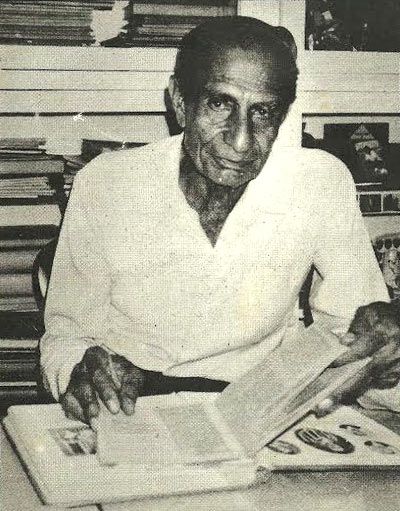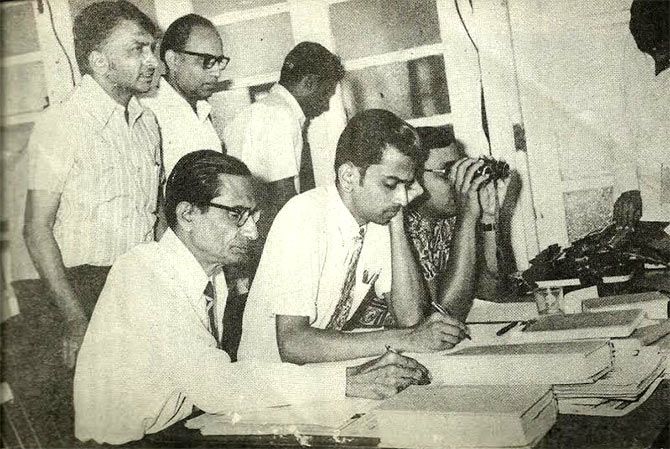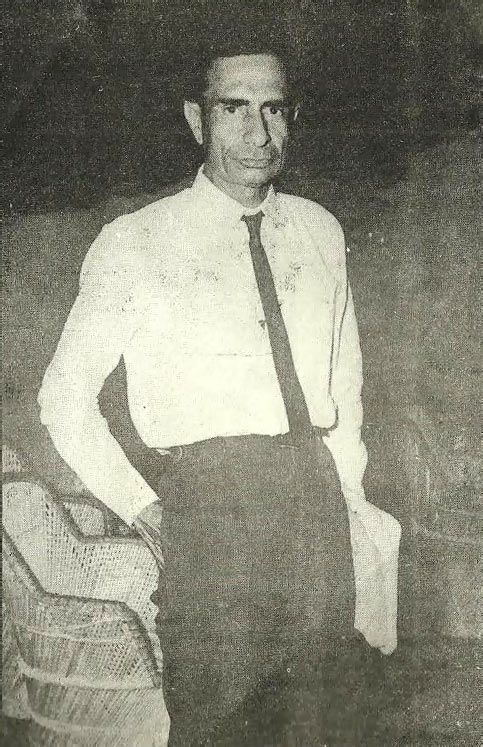
Blessed with a computer-like brain and an elephantine memory, Anandji Dossa was a pioneer in compiling cricket statistics and scores. Haresh Pandya pays tribute to the modest stats-man, who has passed into the ages.
With the demise of the 98-year-old Anandji Dossa, cricket may have lost its last link with an old but beautiful generation.
A scorer and statistician par excellence, Mr Dossa was literally from the old school, when cricket was played as a gentlemen's sport and not defiled by vices like match-fixing.
Scoring is not a cup of tea even for the most dedicated of cricket students, not even in this age of advanced, modern technology. Very few people truly excel at cricket scoring, for it is one of the most difficult of jobs, as it demands a high level of concentration, accuracy, love for figures, ability to make instant counting and calculations, strong memory power and immense patience, among many other qualities.
Now, imagine a man who earned international fame as a scorer and statistician and won rich plaudits from many cricketers in the pre-computer era despite being unequipped with electronic gadgets. You are bound to doff your hat to someone like Mr Dossa, one of the best-known cricket scorers and statisticians of the 20th century, not just in the subcontinent.
A modest man, he carried on the pioneering work started in Indian cricket by men like P N Polishwalla, S K Gurunathan and S K Roy.
Anandji Jamnadas Dossa was born in Mumbai on September 15, 1916. He fell in love with cricket at a young age. A talented right-hand batsman and good medium-pacer who could also keep wickets if required, he captained New Era School, and won the prize for the best batsman in inter-collegiate cricket during his first year at Wilson College.
Dossa, who left the college after one year to join his family's affluent cotton business, came agonisingly close to playing first-class cricket when he figured as a reserve for both the champion teams -- the Hindus in the Pantangulars and Mumbai in the Ranji Trophy in 1941-42. But, like his elder brother Pragji Dossa achieved fame in Gujarati theatre, he was destined to make a name for himself in cricket off the field.
He founded Jolly Cricketers and led the club team in the H D Kanga League tournament in 1948 and 1949. For several years he also represented the now defunct Bombay Cricketers in the Purushottam Shield tournament. He later served Jolly Cricketers, Hindu Gymkhana and Fort Vijay Cricket Club as their honorary secretary. He was a member of the managing committee of the Bombay Cricket Association from 1947 to 1953.
Some of the happy memories of his playing days he cherished included taking a catch off C K Nayudu's bowling in a trial match of the Hindu Gymkhana in 1939-40 as well as playing a match against D B Deodhar in Pune. Dattaram Hindlekar, the Hindus' wicket-keeper, was employed with the Port Trust and he would not report for nets until about 3.30 pm. But the Hindus' captain, L P Jai, was never unduly worried, for he would ask Dossa to keep wickets.
In 1954, his batting won a thrilling match for his team in the Kanga League. Batting first on its home ground, Fort Vijay Cricket Club was bowled out for 130 by tea time, leaving Jolly Cricketers two hours to bat. The latter lost nine wickets and needed seven runs to win off the last two deliveries. Mr Dossa, who had batted patiently till that stage, in desperation, lifted former India medium-pacer G R Sundaram over the tent for a mighty six.
With the scores level and only one delivery remaining and a run required to snatch a sensational win from the jaws of what until then had appeared to be a certain draw, Dossa and V P Shah stole a cheeky single, which was actually a bye, as the wicketkeeper was a bit too far behind the stumps.
'It was one of my proudest moments as a small cricketer,' he recalled humbly.
His love affair with collecting cricket scores, new and used books, and newspaper and magazine articles began from India's 1932 tour of England. It 'inspired' a whole generation of cricketers and sports aficionados. Dossa was no exception. It became a habit for the 16 year old to preserve newspaper clippings after he came across a report describing Indian opener Naoomal Jeoomal's century against Middlesex.
In those years, one of his main sources of information was the M J Collins-edited Indian Cricket magazine, which closed down in 1940. The other, needless to say, was Wisden Cricketers' Almanack.

He continued to remain an amateur collector of cricket scores and records for 20-odd years until a chance meeting with Dicky Rutnagur turned him into a serious statistician. The celebrated commentator-writer was busy compiling the Indian Cricket Field Annual and looking for a reliable statistician. He approached Dossa and made him the statistical editor of the fat volume. The annual ran from 1957 to 1965.
Mr Rutnagur was to play another important role in Mr Dossa's life. He asked him to undertake the responsibility of scoring in a Mumbai-Maharashtra match at the Bombay Gymkhana in 1956 as the regular scorer had expressed his inability to report for the game. All India Radio paid him a princely sum of Rs 15 for his services. After the match Vijay Merchant advised him to be a regular scorer. There was no reason for Mr Dossa to say no to a well-meaning suggestion.
The 1958-59 West Indies team to India played a Test at Brabourne Stadium in Mumbai. The regular scorer asked for a day's leave, citing unavoidable circumstances. Mr Dossa stepped in as a substitute. Mr Merchant wanted him to take up the job on a full-time basis. Mr Dossa's long and illustrious innings as a regular scorer with All India Radio's commentary team was launched.
Mr Merchant encouraged Mr Dossa, a wealthy Gujarati businessman, to take up cricket scoring seriously after being highly impressed by the accuracy of his work and his sharp memory. It was also after the former India opener put in a word that Mr Dossa became a regular scorer in the cricket commentary team of the AIR.
Mr Merchant had probably more confidence in Mr Dossa's memory and knowledge of cricket's history than the man himself. He would telephone Mr Dossa at odd hours and surprise him with unexpected cricketing questions -- about unknown players, umpires, bizarre matches, rain-affected games, venues, riots and so on.
Mr Dossa would often instantly give the information or Mr Merchant would have his answers in a short time.
He has left his unmistakable imprint. Noted cricket statistician H R Gopalakrishna calls Mr Dossa his "guru", saying he "owes much" to him. In fact, he "reveres" him "so much" that he has named his second son Anandji.
Genuine passion for the sport drew Mr Dossa to cricket statistics and scoring. It was never a profession but pure labour of love for him. In purely technical terms, he was equipped with only two tools -- a typewriter and telephone. The typewriter, too, he did not use often enough. Even when he was not busy scoring in the commentary box, he would prefer to hand write his stuff.
As if reflecting his simple and transparent personality, Mr Dossa's handwriting was very neat and clean. He would produce a number of handwritten sheets of paper about statistical and other information. It was usually a futile exercise to find fault in his crystal-clear scoring or whatever information he provided on demand from broadcasters.
Not only commentators, at times, even cricketers would ask Mr Dossa for statistics and other information. He was close to many Indian cricketers and even in the off-season his telephone would ring constantly. He himself would approach cricketers and tell them that they needed some runs or a few wickets to achieve a landmark!
Apart from his love for cricket, Mr Dossa was blessed with a computer-like brain and elephantine memory, which enabled him to come out with amazing statistics and interesting information at times.
Another factor that gave him the edge over others was his fondness for compiling newspaper clippings and collecting rare cricket books.
Pearson Surita was one of the commentators broadcasting the proceedings of the first Test between India and Pakistan at the Brabourne Stadium in Mumbai in 1960-61 for AIR.
'Can you tell me how many runs has Pankaj Roy scored in Test matches with his spectacles on and how many without?' he asked a stunned Mr Dossa.
It was a challenge. But, as Mr Surita expected, Mr Dossa gave him the correct answer the next morning. Similarly, Mr Merchant once asked Mr Dossa in the middle of commentary, 'Is there any incidence of a cricketer who may have celebrated his honeymoon during a Test series?'
It was a tricky question. But Mr Dossa was well-versed in the game's history. 'Kumar Shri Ghanshyamsinhji of Limbdi during India's 1932 tour of England,' he replied, without batting an eyelid.
Mr Dossa further revealed that the newly-married prince had arranged for a private jaunt for his spouse as the Board of Control for Cricket in India did not allow players to take wives on tours.
'She stayed in a separate hotel. The prince would meet her when there was no match. This was how the couple celebrated their honeymoon,' he added.

'Nothing escaped Anandji Dossa's sharp eyes. A master of figures, he has won a permanent place in the roll call of honour. He kept his figures as meticulously as he did his wickets in his salad days when he played the game. He was appreciated by those who followed statistics. He looked as if he had just walked out of Gandhiji's ashram at Wardha,' said the late eminent cricket writer K N Prabhu.
'He was so slight in form and stature. He looked as if he had spent all his life in the counting houses in the Fort area. He looked as wizened and careworn as if Mumbai's Dalal Street was on the verge of its numerous crises. Indeed, I can think of only one other, the late Ray Robinson, who looked in the 80s as he was in his prime. Both gray and dedicated to their work.'
Mr Dossa distinguished himself with his meticulous scoring. His vast cricketing knowledge often came in handy for the commentators to make even the dull atmosphere on the field interesting. From 1959-60 against the West Indies to 1972-73 against England, he scored in all the Test matches played in Mumbai. (He wanted to give up cricket scoring in 1961, but people like Mr Merchant would not let him.)
It was not easy for him to juggle three hats -- to do scoring, maintain statistics and look after his business. But he did an excellent job and never gave any chance to anyone to complain about him or his work.
Even during off days, he used to devote at least six hours of his daily life to cricket statistics, waking up at 4 am and bringing scores up-to-date.
Realising Mr Dossa's passionate attachment with statistics, his wife Gunvanti would help him maintain his books, files, newspaper cuttings, scrapbooks and many other things besides. She had given him a separate 15 x 10 feet room in his Santacruz flat in northwest Mumbai to pursue his passion, saying: 'This is your maidan! Nobody else will come here.'
His prized collection of 1,200 and more books included the 1845 edition of Felix on the Bat by Nicholas Felix, Imperial Cricket by Pelham Warner (published in 1901), James Lillywhite's Cricketers' Annual (edited by the former Surrey County Cricket Club secretary Charles W Alcock) from 1882 to 1893 and all editions of Wisden from 1940 onwards.
Besides genuine love, it takes a lot of time and money to maintain such a vast collection. A few years ago, he donated most of his books to the Cricket Club of India, which appropriately named its reference library after him. He had rendered great service to the Dr H D Kanga Memorial Library, first as an active member of the Board of Management during its formative years, and later as its honorary secretary for three years.
Mr Dossa penned about half-a-dozen books, individually as well as in collaboration, and the notable among them are Cricket Ties: India-Pakistan, Duleep (jointly with Vijay Merchant, Vithal Jhaveri and Vasant Raiji) and The CCI & the Brabourne Stadium (with Vasant Raiji). Along with Anant Setalwad and Virenchee Sagar, he edited The Cricket Quarterly during the three years of its publication in the 1970s,
Total commitment and dedication towards his work was one of the secrets of Mr Dossa's remarkable success story as a cricket scorer and statistician of international repute. He was the chairman of the BCCI's statistical sub-committee from 1973 to 1980, when he voluntarily relinquished the position. He was the first president of the Association of Cricket Statisticians and Scorers of India, which was founded in 1987, and also the editor of The ACSSI Cricket Year Book.
The Anandji Dossa Award for the Scorer of the Year is given to the cricket scorers from Mumbai since 1996. The Anandji Dossa Scholarship has been awarded since 1997 to the scorer who stands first in the annual BCCI examinations. The Sports Journalists Association of Mumbai had honoured Mr Dossa in 1985. The CCI made him an honorary life member during its golden jubilee celebrations.
'Unselfish, modest, self-effacing and always ready to lend a helping hand to a friend or even a stranger (for he had none), Dossa was one of those rare personalities who could be truly described as a gem of a person.' Like Abou Ben Adhem, may his tribe increase,' stated Vasant Raiji.
'He was ready to help anyone. I especially benefited from his knowledge as I regularly went to his house to study nuances of the trade,' confirmed Sudhir Vaidya, who took over from Mr Dossa at AIR in 1973.
A thorough gentleman, Anandji Dossa breathed his last on September 22, 2014.













 © 2025
© 2025